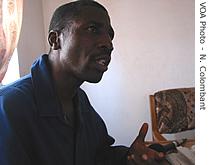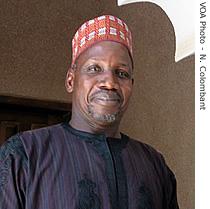2007年VOA标准英语-Nigeria's Northerners Face Challenges of Strugg(在线收听)
Kaduna, Nigeria
20 April 2007
Nigeria's next president is almost certain to be a northerner, as the ruling party candidate and the two main opposition leaders for Saturday's election are from that region. But analysts say replacing the southern president Olusegun Obasanjo is unlikely to change the plight of northerners. The vast, mostly Muslim region, has struggled with change since the advent of elections and decentralized government in 1999. VOA's Nico Colombant reports from the northern city of Kaduna.
 |
| Nassir Abbas |
Abbas says when the repression of the military was replaced with more freedom of expression, along with cuts in social spending, it gave way to a reawakening of regional identities.
"It was not a religious problem but is a political problem. And virtually the politicians were not able to deliver the dividends of democracy. That is why you tend to have the undesirable waste product of humanity. That is the teeming youths who are jobless, who are not working because of certain policy majors that are too hard to swallow," he said. "I mean the reform packages that are ongoing. So therefore these are bitter pills for now, and the reform packages have not really addressed the issue of the downtrodden."
Abbas says introducing Sharia law, as has been the case in a dozen northern states, is not a problem in the long run. But he says identity-driven purposes can lead to communal violence, when they are used for instant political or criminal gain.
"Today, you see the chunk of young men virtually idle, doing nothing, and they are at your beck and call whenever there is a crisis," said Abbas. "They have been used to unleash terror, they have been used to maim, loot, and to create havoc in the society."
Law professor and former legal advisor to military rulers, Auwalu Yadudu, agrees, but says this situation does not exist just in the north.
 |
| Auwalu Yadudu |
Yadudu says when former military ruler and Christian southerner Olusegun Obasanjo emerged as the choice to win the 1999 election, he had to promise the military that when he stepped down his successor would be a Muslim northerner.
As it happens, former military ruler Muhammadu Buhari, the main opponent to ruling party candidate Umaru Musa Yar'Adua, is also from the north.
But even when a northerner takes office, Yadudu says, it will not change the situation in the north.
"Whether it is Yar'Adua or Buhari who wins, you are not going to see some of these agitations and some of these reassertions of identities simply disappearing, simply because it is a Muslim from the north who becomes the president," said Yadudu.
A management and financial consultant in the north, Suleiman Ilu, says northern regions have inherent economic handicaps.
"In the south, they are already industrialized. Whereas industries in [the main city of] Kano and the north are dying by the day because of so many factors which the southern economies have already overcome, for example NEPA. NEPA, National Electric Power Authority, which has been changed to Power Holding Company, the authority giving power, selling power to the people," said Ilu. "Southern industries have been networked to gas, so they do not need NEPA to operate, because they now work on gas. Whilst in the north we still depend on NEPA. And if you depend on diesel, that diesel too is not available in the north. You have to pay three times what the southern industries will pay. So you see you are automatically priced out of the market. So this is why the industries are dying."
Ilu says the north should turn more to large scale farming, but that repeated promises to invest some of the southern oil profits to northern economic programs have fallen through amid corruption, mismanagement but also previous efforts to pay off Nigeria's post-independence debt, which has now been mostly written off.